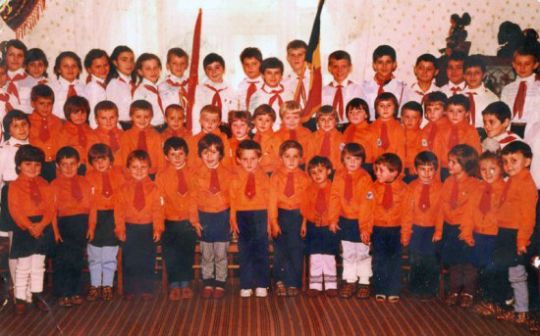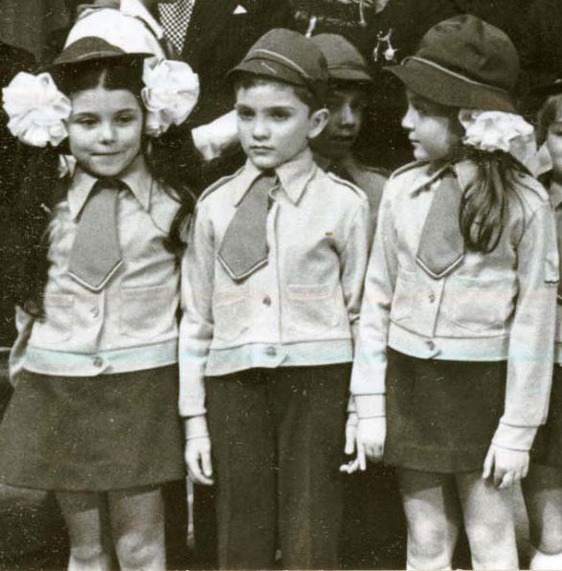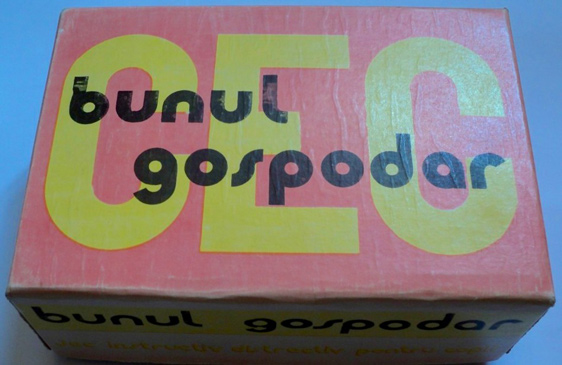The hidden meanings of Destined to be Happy exhibition - The Interview with Irina Korina
10 January 2017 | By
09 January 2017 | By
Inside the Picture: Installation Art in Three Acts - by Jane A. Sharp
19 November 2016 | By
Conversations with Andrei Monastyrski - by Sabine Hänsgen
17 November 2016 | By
Thinking Pictures | Introduction - by Jane A. Sharp
15 November 2016 | By
31 October 2016 | By
Tatlin and his objects - by James McLean
02 August 2016 | By
Housing, interior design and the Soviet woman during the Khrushchev era - by Jemimah Hudson
02 August 2016 | By
Dressing the Soviet Woman Part 3: "Are Russians Women?" Vogue on Soviet Vanity - by Waleria Dorogova
18 May 2016 | By
Dressing the Soviet Woman Part 1 - by Waleria Dorogova
13 May 2016 | By
Eisenstein's Circle: Interview With Artist Alisa Oleva
31 March 2016 | By
Mescherin and his Elektronik Orchestra - by James McLean
13 January 2016 | By
SSEES Centenary Film Festival Opening Night - A review by Georgina Saunders
27 October 2015 | By
Nijinsky's Jeux by Olivia Bašić
28 July 2015 | By
Learning the theremin by Ortino
06 July 2015 | By
Impressions of Post- Soviet Warsaw by Harriet Halsey
05 May 2015 | By
Facing the Monument: Facing the Future
11 March 2015 | By Bazarov
'Bolt' and the problem of Soviet ballet, 1931
16 February 2015 | By Ivan Sollertinsky
Some Thoughts on the Ballets Russes Abroad
16 December 2014 | By Isabel Stockholm
Last Orders for the Grand Duchy
11 December 2014 | By Bazarov
Rozanova and Malevich – Racing Towards Abstraction?
15 October 2014 | By Mollie Arbuthnot
Cold War Curios: Chasing Down Classics of Soviet Design
25 September 2014 | By
Walter Spies, Moscow 1895 – Indonesia 1942
13 August 2014 | By Bazarov
'Lenin is a Mushroom' and Other Spoofs from the Late Soviet Era
07 August 2014 | By Eugenia Ellanskaya
From Canvas to Fabric: Liubov Popova and Sonia Delaunay
29 July 2014 | By Alex Chiriac
My Communist Childhood: Growing up in Soviet Romania
21 July 2014 | By Alex Chiriac
Monumental Misconceptions: The Artist as Liberator of Forgotten Art
12 May 2014 | By Rachel Hajek
28 April 2014 | By Rachel Hajek
An Orgy Becomes a Brawl: Chagall's Illustrations for Gogol's Dead Souls
14 April 2014 | By Josephine Roulet
KINO/FILM | Stone Lithography Demonstration at the London Print Studio
08 April 2014 | By Alex Chiriac
24 March 2014 | By Renée-Claude Landry
Book review | A Mysterious Accord: 65 Maximiliana, or the Illegal Practice of Astronomy
19 March 2014 | By Rosie Rockel
Leading Ladies: Laura Knight and the Ballets Russes
10 March 2014 | By Bazarov
Exhibition Review | Cash flow: The Russian Pavilion at the 2013 Venice Biennale
03 March 2014 | By Rosie Rockel
24 February 2014 | By Ellie Pavey
Guest Blog | Pulsating Crystals
17 February 2014 | By Robert Chandler Chandler
Theatre Review | Portrait as Presence in Fortune’s Fool (1848) by Ivan Turgenev
10 February 2014 | By Bazarov
03 February 2014 | By Paul Rennie
Amazons in Australia – Unravelling Space and Place Down-Under
27 January 2014 | By Bazarov
Exhibition Review | Siberia and the East, fire and ice. A synthesis of the indigenous and the exotic
11 December 2013 | By Nina Lobanov-Rostovsky
Shostakovich: A Russian Composer?
05 December 2013 | By Bazarov
Marianne von Werefkin: Western Art – Russian Soul
05 November 2013 | By Bazarov
Chagall Self-portraits at the Musée Chagall, Nice/St Paul-de-Vence
28 September 2013 | By Bazarov
31 July 2013 | By Richard Barling
Exhibition review | Lissitsky — Kabakov: Utopia and Reality
25 April 2013 | By Richard Barling
Exhibition review | Ilya and Emilia Kabakov: The Happiest Man
18 April 2013 | By Richard Barling
21 July 2014 | By Alex Chiriac

One got to be a Pioneer form the second year of primary school. In nursery school we were ‘Soimii Patriei’, that is ‘The Eagles of the Motherland’. The uniform was orange and scratchy, but girls did get to wear a headband with enormous white pompoms on special occasions.

End of year festivities were a particular boon, as we got to forgo the uniform for costumes made by skilled mothers and grandmothers. I was Little Red Riding Hood one year, lisping my part with glee, but my firm favourite had to be the green polyester ball gown I wore as the personification of Spring, complete with paper swallows sewn into the frills.
Other entertainment was not easy to come by. ‘The Eagles’ did have their own magazine, whose cover invariably showed smiley happy children in scratchy orange uniforms. TV programmes were thin on the ground and hardly any were dedicated to children. The lucky people who, through some technological hocus-pocus, captured channels from neighbouring countries got to learn a bit of Russian while watching the wolf chase the bunny, shouting ‘Nu pogodi!’. The local success was ‘Mihaela’, a cartoon series about a blonde girl and her dog, which even won prizes at international film festivals. Mihaela wore pom-poms too, thus cementing them as the fashion accessory of choice for schoolgirls building socialism. Here she is going to holiday camp with her fellow classmates, another common activity:
Mihaela On Holiday, one of the few Romanian-made Soviet animations
Board games were also enjoyed at holiday camp or at home. The most memorable one is what I now recognise as the Communist version of Monopoly. At that time I had, of course, never heard of Monopoly and the thought of dealing in properties would have probably horrified me. Monopoly’s Romanian incarnation was called ‘Bunul Gospodar’, roughly translatable as ‘The Good Homemaker’. Intriguingly, it taught little socialists to consume, albeit in a responsible way. Going round the board players would have to save up enough money to buy an apartment and furnish it with all mod cons, while also enjoying the many delights of Communist life such as playing sports or taking educational trips. I leave you with an extract from the game’s instructions:
‘The Good Homemaker is for children of school-age. The goal is to develop the economical spirit of the child, and develop skills that lead to a rational, orderly, dignified life in which hard work is harmoniously complemented by a passion for sport, literature and art. The game will inspire devotion for the past struggles of our nation, as well as its current and future achievements.’



